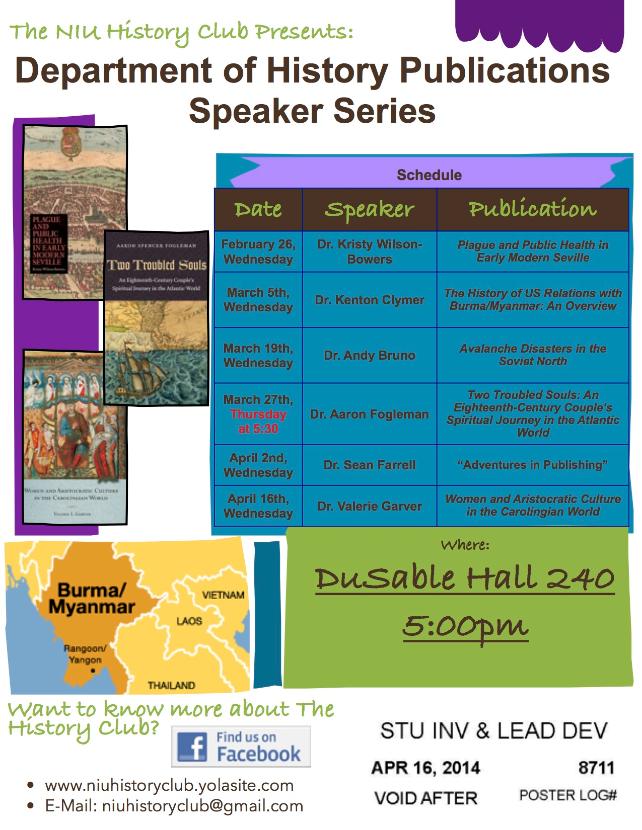Department of History Publications Spring Speaker Series, 2014

History and Humanitarianism Spring Speaker Series, 2013

Dr. J.D. Bowers
on Studying Genocide
April 17th, 2013- Four parts in all.
Dr. Ismael Montana
on The Rwanda Genocide
March 20th, 2013- Four parts in all.
Dr. Valerie Garver
on Medieval Charity
April 3rd, 2013- Four parts in all.
Dr. Trude Jacobsen
on Fragile States: Interpretations and Case studies
February 20th, 2013- Four parts in all.
E. Taylor Atkins - Director of Undergraduate Studies

Doctor Atkins is a Professor and the Director of Undergraduate Studies at NIU. He came in to talk to us about History undergrad requirements.
A link to the official catalog of requirements: http://www.niu.edu/history/faculty/profiles/atkins.shtml
He is the master mind and director of the new catolog. It was designed to make sure students don't just choose the same time periods and locations in history, but instead to broaden their horizons and study history somewhere else. As you can see in the requirements, you must choose one class from each catagory of A, B, and C. Catagory A is pre-modern history, not pertaining to any geography. Catagory B is non-western history (Asia, Africa, Latin America, Global, modern). And finally catagory C is the United States, European, and Russian history.
To make sure you are completing all your requirements to graduate, you can also look at your 'Degree Progess Report', located on your myniu page. If you have any questions, you can always contact Professor Atkins or Professor Hink during their office hours in Zulauf.
If ever you want to take a class, but it appears full on your myniu, pick up a 'closed class permit' from the main office on the 7th floor of Zulauf, and contact the instructor of the class you want to take. There's no gaurantee that they'll let you take it, but there's a pretty good chance.
Link to his NIU page: http://www.niu.edu/history/faculty/profiles/atkins.shtml
A link to his personal page: http://www.niu.edu/etatkins/ this page is an excellent resource for writing your own papers. It includes a list of writing guidelines that he uses when evaluating essays.
Cathy Doederlein - Internship Coordinator

Cathy Doederlein is the Coordinator of Internships for the Humanities here at NIU, and she came in to talk to us about why it is important to do an internship as an undergrad, and she shared with us some internships that were available. They are a great way to experience work in your field of study prior to graduation, and it looks great on resumes for jobs or graduate schools (Really gets you a step ahead from the competition!) It is also interesting to know that you could earn 3 hours of class credit by doing internships through NIU. Cathy is more than happy to meet with students in person or speak by phone. Feel free to call or e-mail to arrange an appointment and learn what an internship experience is all about!
cdoerderlein1@niu.edu 815-753-1016 Office- Zulauf Hall 307 (call or email first because office might change)
Her facebook group: http://www.facebook.com/?sk=2361831622#!/pages/NIU-Humanities-Majors-Internships/291502457546601 or search NIU Humanities Majors Internships
From her 'linked-in' page:
"I currently work as the Coordinator of Internships for Humanities Majors at Northern Illinois University. In this role, I serve as the primary point of contact for Internships for Humanities Majors (Communication, History, English, Philosophy, and Foreign Languages & Literatures). I work with students to find internships that will be well-matched to their skills/interests. I help students develop their resumes and assist them in preparation for the interview process. I also work with students during their internships to ensure that the experience is meeting the expectations of a successful internship, and ensure that they are able to apply their classroom knowledge to the work being done in their internship. Additionally, I work with companies to seek out additional internship opportunities for Humanities majors and assist companies in developing their internship programs to ensure they are as beneficial as possible for both the students and the companies." (http://www.linkedin.com/in/cdoederlein)
Additional sources:
Visit Victor eRecruiting (www.niu.edu/careerservices/erecruiting/student.shtml). Post your resume and search the database for internship opportunities.
Attend the Internship Fairs (www.niu.edu/CareerServices). Look for dates and company information.
Read your NIU email. History majors receive occasional emails about current internships opportunities.
Network. Pursue contacts received through family and friends for their ideas and contacts which may lead you to an internship opportunity.
Teri A. Schmidgall - NIU Career Councelor

Teri Schmidgall is a career councelor at NIU who specializes in assisting students with majors in foreign language, history, sociology, family and child studies, pre-PT and PT. If you ever need her assistance, here is her contact information:
-
(815) 753-1641
- NIU Career Services Campus Life Building, 220
- careerservices@niu.edu
- NIU.edu/careerservices
- Facebook.com/NIUCareerServices
Some advice from Teri and the Career Center:
- Invest time in exploration/clarification of career goals.
Utilize resources on campus.
Ingratiate yourself with your faculty.
Take advantage of additional research opportunities.
Get involved.
Plan early for graduate school.
Don’t wait! Senior year is too late to figure these things out.
Resources/Helpful Links:
- Huskies Get Hired: http://niu.experience.com/experience/login
- Career Fairs: http://www.niu.edu/careerservices/jobfairs/index.shtml
- Major Web Links (list of careers per major): http://www.niu.edu/careerservices/weblinks/index.shtml
What Career Services can offer:
About Résumé Reviews
Students who are living on-campus stop in CLB 235 for a walk-up résumé critique or a career counseling appointment to have your résumé reviewed.
- Fall and Spring Semesters
Monday - Friday
8:15 a.m. - 3:45 p.m. - Summer Semester
Monday - Thursday
8:15 a.m. - 4:30 p.m.
Greg Bereiter - History Graduate Student
Greg is a graduate and Ph.D. Candidate (in the Department of History) here at NIU. He came in to give us a student's perspective on graduate school. He prepared for us some advice:
When Choosing a Graduate School.......
- Take stock of “you”- Consider why you want to pursue graduate studies in history, as well as your specific research interests. Contemplate your long-term career goals. Consider where you would be comfortable living. Think about cost of living, climate, available services, as well as your partner's career goals/employment (if applicable).
- Satisfaction of current students- Get the candid perspective of current students in the program. Find out about faculty,Asistantships, fellowships, and related financial assistance.
- Location & size- Consider how far you might be from your support network of friends and family. Take into account the size of the department. Think about if you would rather have a large or small cohort group. Don’t forget about faculty-to-student ratio and overall class sizes, as these can play a major role in having a quality experience.
- Type of program- Expectations will vary significantly at each institution. Consider the coursework expected of you in each program. Find out if the program is focused on research or teaching. Learn about faculty research interests to ensure that they share some of your own. Not all schools offer programs in the discipline in your area of interest. It may sound obvious, but figuring this out will possibly shorten your list of potential schools.
- Degrees- Find out exactly how long each degree program will take to complete. Discover any prerequisite courses required to enter the program. Inquire about language or quantitative methods requirements.
- Quality of program- To determine quality, consider a program’s:
- commitment to research & scholarship
- reputation of the school, faculty & alumni
- admissions standards & care taken in selection of graduate students
- year-to-year funding packages available for graduate students
- research funding offered to Ph.D. students at the dissertation stage
Questions to ponder before pursuing graduate studies in history:
- What are 2-3 good reasons for me to go to grad school? (The following don’t count: “I don't know what to do with my life.” “I can't find a job.”)
- What are 2-3 good reasons a graduate program would find my application more attractive than numerous other applications? (The following don’t count: “I’ve always enjoyed reading.” “I like books.”)
- Am I prepared to spend 2 years completing a master’s degree and another 5 to 7 years completing a Ph.D.?
- Most doctoral programs require students to demonstrate competency in two foreign languages. Other than English, which languages can I read?
- In graduate school I will compete with students who find immense joy and purpose in their research. In my own upper-division HIST courses, do I enjoy doing research and writing papers at least as much as I enjoy reading the secondary literature itself?
- What will I specialize in? What are my precise research interests?
- If I don’t get into graduate school, or if I earn a Ph.D. but can’t get a tenure-track professorial job, what else could I do to lead a satisfying and meaningful life?
Some enlightening appraisals of graduate studies in the humanities:
- http://chronicle.com/article/Graduate-School-in-the/44846
- http://chronicle.com/article/Just-Dont-Go-Part-2/44786/?otd=Y2xpY2t0aHJ1Ojo6c293aWRnZXQ6OjpjaGFubmVsOmFkdmljZSxhcnRpY2xl
- http://chronicle.com/article/If-You-Must-Go-to-Grad-School/45269/
- http://chronicle.com/article/Neither-a-Trap-Nor-a-Lie/64535/?otd=Y2xpY2t0aHJ1Ojo6c293aWRnZXQ6OjpjaGFubmVsOmFkdmljZSxhcnRpY2
- http://chronicle.com/article/Letters-About-Graduate-School/63938/
- http://chronicle.com/article/The-Big-Lie-About-the-Life-of/63937/?otd=Y2xpY2t0aHJ1Ojo6c293aWRnZXQ6OjpjaGFubmVsOmFkdmljZSxhcnRpY2x
- http://chronicle.com/article/We-Need-to-Acknowledge-the/64885/?otd=Y2xpY2t0aHJ1Ojo6c293aWRnZXQ6OjpjaGFubmVsOmFkdmljZSxhcnRpY2
- http://www.selloutyoursoul.com/2010/11/02/phd-job-hell-an-open-letter-to-thomas-h-benton-a-k-a-william-a-pannapacker-how-graduate-school-in-the-humanities-just-dont-go-destroyed-my-ph-d-and-saved-my-life/
- http://100rsns.blogspot.com/
- http://100rsns.blogspot.com/p/if-you-decide-to-go-anyway.html
Lauren Mock - Study Abroad Outreach and Programming Coordinator

Lauren Mock is the Outreach and Programming Coordinator for the NIU Study Abroad Office. Lauren comes in to talk to us about the benefits of studying and interning abroad. Not only is it a fun experience, but it also looks good on resumes. Employers are more likely to choose candidates that have experience abroad. She also explains how affordable and easy it is, contrary to what most may think. Conveniently she provided us with a list of Study Abroad programs available through NIU that have courses and internship opportunities for history majors. Click on the .pdf files below to see the list:

|
Study Abroad for History 1.pdf Size : 879.687 Kb Type : pdf |

|
Study Abroad for History 2.pdf Size : 808.563 Kb Type : pdf |
The Study Abroad office is a walk-in office, so you can come in anytime during their office hours with questions. The staff is very friendly and helpful, and will assist you with any concerns about programs, financial resources, health and safety abroad, and much more. They are located at Williston Hall on the fourth floor, in room 417. Their office hours are the typical on-campus office hours: 8am-12pm, 1pm-4pm, Monday-Friday. You can also call them with your questions: (815) 753-0700 or e-mail them at: niuabroad@niu.edu .